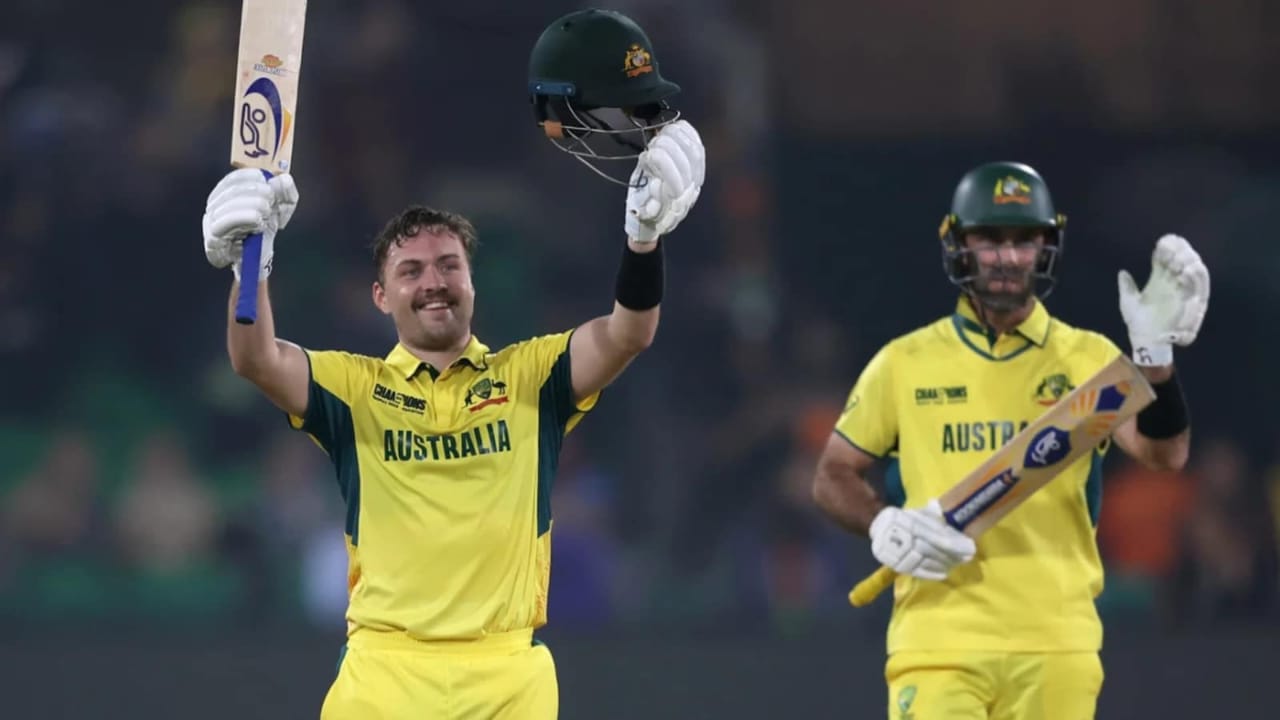Josh Inglis 120* seals record win for Australia in Champions Trophy 2025
Ben Duckett provided the ruthlessness England so desperately craved for with a record knock of 165. But his heroics went in vain as Josh Inglis countered by pummelling a lacklustre England pace attack and powering Australia to the highest successful chase in men's ICC tournament history.
The first match at an ICC event in Lahore since March 1996 saw batting completely dominate this Champions Trophy blockbuster with little margin for error for the bowlers on such a benign surface.
With a mixture of inventive strokes and meaty backfoot blows, England-born Inglis hit his maiden ODI century to finish unbeaten on 120 from 86 balls as Australia reached the target of 352 with relative ease in the 48th over. England's bowlers struggled to handle the dew under lights, with Australia achieving their second-highest successful ODI chase after their 359 for 6 against India in Mohali in 2019.
It was a bitter disappointment for England, who now face must-win games against Afghanistan and South Africa. They ultimately will rue falling a little bit short with the bat, but Duckett's magnificent 165 off 143 was the highest individual score in Champions Trophy history. He received strong support from Joe Root, who made a crisp 68 in a third-wicket partnership of 158.
Even though no other batter scored more than 25 runs, England still compiled the highest-ever total in the tournament and took full toll on the least experienced Australian attack at an ICC ODI event since 1983. They were without frontline quicks Pat Cummins, Josh Hazlewood and Mitchell Starc, while seam-bowling allrounders Cameron Green, Mitchell Marsh and Marcus Stoinis are also missing.
However, the result was not a fait accompli on this flat surface, with Australia boasting a deep batting line-up. Australia's innings was similar to England's, with two early wickets taken by Travis Head and Steven Smith, who took over for Head, during the powerplay. Having blazed an unforgettable century the last time he was sighted at a 50-over ICC event, Head loomed as the key but on 6 his swipe hit the toe-end of the bat and Jofra Archer held a sharp return catch.
Smith could only edge to slip a hard-length delivery from speedster Mark Wood, who was in great rhythm and consistently hitting speeds of 150 kph. But Matthew Short and Marnus Labuschagne came back with a 95-run stand because they liked Brydon Carse a lot. Short overcame a lean run of form by superbly using the pace of England's quicks but legspinner Adil Rashid bowled a brilliant spell in combination with Liam Livingstone that squeezed the batters.
A frustrated Labuschagne hit a slow 70 kph legbreak from Rashid straight to cover before Short on 63 offered a return catch to Livingstone as Australia slumped to 136 for 4.
But Rashid was taken out of the attack after his six-over spell, allowing Inglis and Alex Carey to settle. As they overcame a struggling England pace attack, the pair displayed their strong form, having both scored centuries in a counterattacking Test against Sri Lanka. After Carey hit Rashid straight to deep midwicket, Carey sheepishly celebrated his 50th birthday, only for Archer to drop a sitter. After that, Inglis smashed Archer for consecutive goals as England began to lose momentum. Carey hit Carse straight to mid-off as Australia began to gain control, leaving 70 off 50 balls. But Inglis didn't care and scored a six off Archer to celebrate his century. Before Inglis fittingly clinched victory with a six, Glenn Maxwell was unstoppable. This was a fantastic victory for Australia, the World Cup champions, whose title hopes had been largely discounted prior to the tournament. Smith elected to bowl after being swayed that dew would play a factor under lights as Australia stepped onto the field at an ICC event without their big three quicks for the first time in nine years.
On the pitch's road, Australia's significantly weakened attack was immediately put under pressure. There was no Starc, but Australia were not short on aggressive left-arm quicks with Spencer Johnson, whose trademark golden locks had been shorn off, and Ben Dwarshuis handed the new ball.
Dwarshuis was selected ahead of Sean Abbott, who had played in both of Australia's ODI games in Sri Lanka, for match-up reasons although his two early wickets were mostly due to rash strokes.
At first, England's reorganized batting lineup didn't go as planned. Phil Salt fell in the second over after falling to clear the onside as a high-flying Carey plucked a one-handed blinder to his right, which was a common annoyance for them. It was a spectacular first-ever ODI catch for Carey as an outfielder and helped justify the decision for Inglis, the incumbent white-ball wicketkeeper, to retain the gloves.
Jamie Smith, who batted at No. 3 for the first time in international cricket and only the second time in his List A career, was the focus of all of the attention. His decision necessitated that Jos Buttler, Harry Brook, and Joe Root move down from their usual positions. After hitting a few stunning cover drives, Smith calmly dropped to the side, where Carey caught him much more easily this time. England did not envision being 43 for 2, but they recovered quickly as Duckett and Root cashed in on errant bowling from Johnson and Dwarshuis. England moved to 73 for 2 with a boundary from Duckett's final powerplay delivery, despite his slow start. Smith reverted to spin after the restrictions were eased but there was little turn on offer as Duckett and Root easily rotated the strike. Smith was fairly conservative with his tactics and deployed four sweepers.






